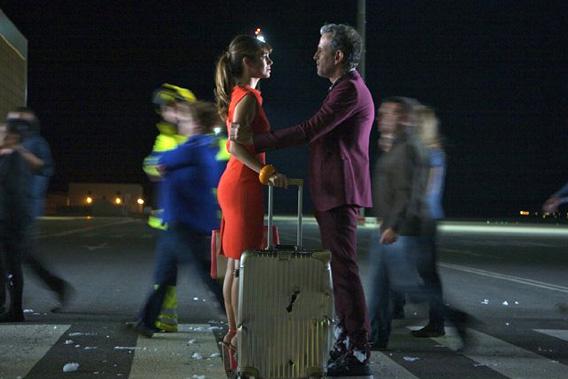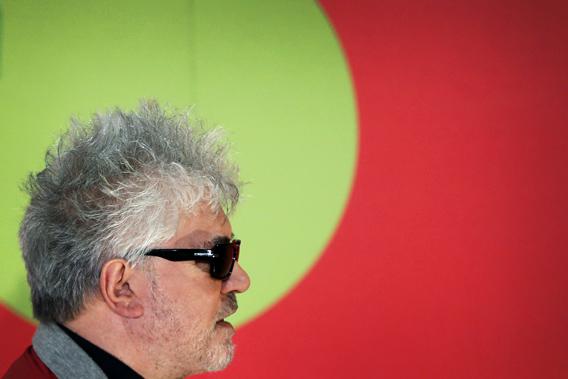I’m So Excited, Pedro Almodóvar’s 19th feature film, is a comedy about a plane that may be about to crash. As the pilots try to find a way to land safely—and to enjoy sex and drugs—the crew sedates the economy-class passengers, performs karaoke, and distributes mind-altering substances to the first-class passengers, who include corrupt bankers, high-class prostitutes, famous actors, and hit men. Slate’s June Thomas spoke with Almodóvar about the film, what it says about Spain’s terrible economic situation, and whether he’ll ever make a Hollywood movie.
June Thomas: This is your first full-on comedy for a long time, perhaps since 1988’s Women on the Verge of a Nervous Breakdown. Given that there’s a serious financial crisis in Spain right now, it’s surprising to me that you decided to make a comedy.
Pedro Almodóvar: The truth is that when I began to write the script, we didn’t yet know that we were going to hit this crisis. But when I was rewriting—and for me writing a script means rewriting it many times—we were already drowning in it. I like the idea that in these terrible times, Spaniards can go to the movies, see this film, and laugh for an hour and a half. In Spain right now, it’s very difficult to turn the current situation into comedy, although a few comedians are trying. I think that this is the worst moment that we have experienced since the arrival of democracy in Spain.
Thomas: In this film, you deal with corrupt bankers and wasteful construction projects like the Ciudad Real airport that have almost bankrupted Spain. Why did you choose to make a political film now?
Almodóvar: I think my films are always political, even if I don’t put explicitly political things in them. The moral autonomy that my characters have—specifically the female characters—is political. In this case, just mentioning the airport in La Mancha—that speaks in a very immediate way about the situation in Spain. (The real airport is Ciudad Real, but they told me not to use that name.) The construction of an airport like this and of other places—useless conference centers and convention halls that are completely worthless; there were a lot of them—is responsible for the crisis. So, visually, the airport is a very powerful metaphor for the banks’ abuse. It speaks to the megalomania of it all. The corruption of politicians, along with the unscrupulous financiers who signed contracts and found funds to create these white elephants.
I’m a little concerned if the movie can survive without all those references, because I can understand that, for example, American audiences don’t know exactly what is happening in Spain. I hope that the movie can overcome that and just be funny, even if viewers don’t know what is happening in my country.
Thomas: I think of you as the great filmmaker of repetition. You return again and again to the same themes—sometimes even to the same scenes—without it seeming repetitive. Do you agree?
Almodóvar: Yes, yes. Absolutely. I return to the same things, but I return in a different way every time, because in every moment of your life, you see things differently, or you have different things to say. You can make a thousand different movies about the same subject. For example, in one of the scripts that I’ll probably do next, the protagonists are mostly women, and it’s all about motherhood. I’ve made many movies in which the characters have been mothers, but I still have a feeling that this is different, because the stories that I’m going to tell are different. Am I repeating? It doesn’t seem that way to me. And I’m sure that it will be very different from the other mothers. These themes are quite eternal.
Thomas: At the beginning of this film, the crew puts all the people in economy class to sleep. The film takes place in first class. That’s an interesting switch from your early focus on working-class people.
Almodóvar: I am in solidarity with the tourist class. The pilots say, “Let’s drug the tourist class, then they won’t complain, and we won’t have any problems.” That’s an abuse of power. But this is also a comedy, so they’re omnisexual, and at least it’s amusing.
Thomas: It’s also social commentary that the middle class is unconscious.
Almodóvar: Yes, in Spain now, while the whole population are victims of the kind of government we have, they absolutely killed the middle class, and that’s why the economic problems are getting worse and worse. The middle class is the class that consumes, and now they’re unemployed. But my intention from the beginning was to make something unreal. Of course, reality seeps in through the cracks, and it’s always welcome, but I tried to put the story up in the clouds in a very unreal place.
Thomas: For the last 20 years I’ve been expecting to hear that you’ve signed to make a Hollywood movie. You haven’t yet. Will you ever go to Hollywood?

Courtesy of El Deseo S.A.
Almodóvar: Not to Hollywood. If I make a movie in English, the money will come from Europe, so that I can keep my independence and freedom. The way they produce in Hollywood doesn’t fit me. There are many people with decision-making power, and I’m not accustomed to working like that. But here there are wonderful actors and actresses that I would like to work with. I mean, for example, yesterday I met for the first time someone that I admire very much—Jessica Chastain—and I thought, “It’s a pity that I don’t make movies in English,” because she was very enthusiastic about the idea. So, I don’t know. For the moment the two scripts that I have in my hands happen in Spain. Very different subjects, but they happen in Spain.
Thomas: I always said that if I could just ask one question, the thing that I most wanted to know was why your brother Agustín wasn’t in The Flower of My Secret. It’s the only movie he doesn’t make a cameo in.
Almodóvar: Agustín isn’t in The Flower of My Secret?
Thomas: I’ve watched it several times trying to find him. [June 25, 1:40 p.m.: I was wrong. See below.]
Almodóvar: If you didn’t find him, he’s not. I didn’t know! I thought that Agustín was in all of my movies. He asked for that, and now after making 19 movies, it’s like a sign of identity. It’s curious, because The Flower of My Secret and Volver are the two movies in which I talk most—and most deeply—about my mother, all the memories of my childhood, and the characters that I was surrounded by when I was a child in La Mancha. Agustín is part of the family, so he should be there.
Thomas: At the beginning of I’m So Excited, two of “your” actors who went on to international superstardom, Penélope Cruz and Antonio Banderas, appear in small roles. These characters distract the ground crew, which sets the disaster—or the near-disaster—of the movie in motion. Is this a commentary on celebrity culture?
Almodóvar: No, no, not at all. My intention was on one hand just to spend a day shooting with them—that was always a joy for the three of us. And it was also about family. They belong to my artistic family, and they are part of my emotional support system. It was almost like: Penélope and Antonio say hello, just to introduce the spectator to the movie, and they say, “Pedro has returned to comedy, so welcome to the plane.”
This interview has been edited and condensed.
Correction, June 25, 2013: Contrary to June Thomas’ declaration in this interview, Agustín Almodóvar did make a cameo in The Flower of My Secret. He is seen in the press room of El País newspaper. (Return to the corrected sentence.)
